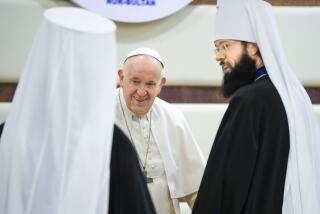Gorbachev Vows No Interference With Religion
- Share via
MOSCOW — Soviet leader Mikhail S. Gorbachev met the leader of the Russian Orthodox Church on Friday and said the Soviet state had made tragic mistakes in its past treatment of Christians, the Tass news agency said.
In his first formal reception of Russian Orthodox Church Patriarch Pimen, Gorbachev also said believers “have the full right to express their conviction with dignity” and pledged that the state would not interfere.
Gorbachev said Christians had suffered during the “cult of personality,” a reference to the bloody rule of late Soviet dictator Josef Stalin.
Mistakes Conceded
“Not everything was easy and simple in the sphere of state-church relations. . . . Religious organizations were also affected by the tragic developments that occurred in the period of the cult of personality,” Gorbachev said, according to Tass.
“Mistakes made with regard to the church and believers in the 1930s and the years that followed are being rectified. Our newspapers and magazines write about this with candor and objectivity,” he said.
During the 1930s, Stalin closed hundreds of churches and sent many believers to labor camps. He relented only during World War II, when he needed church support and permitted the reopening of some churches.
Soviet leader Nikita S. Khrushchev revived the persecution and closed many of the churches that had remained open.
Gorbachev met Pimen and members of the Holy Synod at their request in connection with the upcoming millennium of Christianity in Russia, Tass said.
The meeting took place at St. Catherine’s Palace in the Kremlin, and part of it was shown on Soviet television on Friday evening.
Gorbachev told them that there were differences between the church and Soviet state in world outlook.
But he spoke of a new approach to church-state relations under perestroika , or restructuring, a general word Gorbachev uses for his program of social and economic reforms.
“The believers are Soviet people, workers, patriots, and they have the full right to express their conviction with dignity.
Freedom of Conscience
“ Perestroika , democratization, concern them as well--in full measure and without any restriction,” he said, according to Tass.
Gorbachev said that a new law on freedom of conscience was now being drafted that would “reflect the interests of religious organizations as well.” He did not elaborate.
The Soviet leader said that under Soviet state founder V. I. Lenin, a decree had been passed to enable the church to carry on its activities without any outside interference.
But he said the Soviet government had departed from those principles and they are now being restored, Tass reported.
Praying for Success
Pimen responded with very warm words, telling Gorbachev that the church is praying for the success of perestroika .
“We church people ardently pray for the success of the restructuring process and strive to do everything possible for its development,” Pimen said.
But Pimen added that not all church problems were solved and expressed hope for their resolution.
Pimen, 77, who has steered the church for 17 years, has been criticized recently by dissident priests who accuse him of sycophancy to an atheist state.
Repression Cited
Gorbachev said last November that Stalin made gross political mistakes and that many people inside and outside the Communist Party had been subject to repression, but he has not spoken directly of state persecution of Christians before.
His meeting with Pimen and members of the Holy Synod was the only time in recent memory that the leader of the Kremlin had received the leader of the Orthodox Church.
It follows other signs that the church is receiving more scope to run its own affairs.
The Soviet state, which has a Council on Religious Affairs that oversees the Orthodox Church, is allowing the church to prepare numerous events in June marking 1,000 years of Christianity in Russia.
The church will also be holding a council of bishops, only the third such gathering that the Soviet government has permitted since World War II.
Gorbachev said the millennium had not only religious “but also social and political significance,” Tass said.
He noted that the Soviet state had helped create the conditions for the millennium by returning some monasteries to the church.
More to Read
Sign up for Essential California
The most important California stories and recommendations in your inbox every morning.
You may occasionally receive promotional content from the Los Angeles Times.













